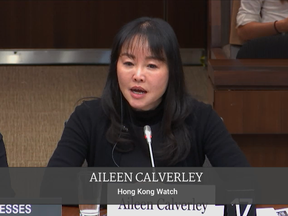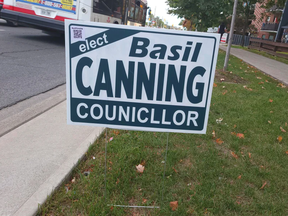FIRST READING: It's 'entirely illegal' for China to open police stations here, says Ottawa!
Feds say they're backing off on taking action until the RCMP can confirm the stations are real

Article content
First Reading is a daily newsletter keeping you posted on the travails of Canadian politicos, all curated by the National Post’s own Tristin Hopper. To get an early version sent directly to your inbox every Monday to Thursday at 6:30 p.m. ET (and 9 a.m. on Saturdays), sign up here.
Article content
TOP STORY
Article content
Federal officials confirmed this week that it would be “entirely illegal” for Beijing to open police stations on Canadian soil, but that it would nevertheless fit within a pattern of growing Chinese interference in Canadian affairs.
“The activity that’s being alleged (the police stations) would be entirely illegal, totally inappropriate and would be the subject of very serious representations,” Weldon Epp, a China lead with Global Affairs Canada, told a Tuesday meeting of the House of Commons committee on relations between Canada and the People’s Republic of China.
The hearing was dominated by recent reports that Chinese law enforcement had opened three “service stations” in the Greater Toronto Area.
Article content
Last month, a report by the human rights group Safeguard Defenders detailed the existence of more than 50 “service stations” operated around the world by Chinese security services.
Three of them were in Canada, in Toronto neighbourhoods heavily populated by Chinese-Canadians.
The three addresses, provided to the National Post by Safeguard Defenders, show a private home in Markham, a convenience store in Scarborough and an address also listed as the headquarters of the Canada Toronto Fuqing Business Association.
The official word from China is that the stations are merely places for expats to conveniently renew IDs or drivers’ licences.
When one such station was discovered in Dublin, Ireland, the Chinese embassy’s official explanation to The Irish Times was “the pandemic made international travels not easy and quite a few Chinese nationals found their Chinese ID cards and/or driver licences expired or about to expire, and yet they could not get the ID renewed back in China in time.”
Article content
But according to Safeguard Defenders, the stations are clandestine hubs in the Chinese program of “involuntary return” — a system by which China compels its expats to return home for punishment in instances where they’re deemed to have violated Chinese law while abroad.
In just the last year, China itself has boasted that 230,000 of their nationals have been “persuaded to return” on various charges.
Epp told the committee that Canada has not filed a diplomatic complaint with Beijing over the stations pending the results of an RCMP investigation to confirm the allegations within the Safeguard Defenders report.
But he did tell the committee that there is “growing evidence of foreign interference” in Canada by China.
Article content
“Evidence suggests that the largest source of foreign interference in Canada by state actors is coming from (People’s Republic of China) sources,” said Epp, citing the latest report from the National Security and Intelligence Committee of Parliamentarians.
He also said that the previous two years have brought a distinctive chill to his usual contacts with People’s Republic of China critics or dissident groups based in Canada.
“It’s really only in the last couple of years that the balance of conversation has shifted to them talking about how intimidated they feel within Canada, and the growing risk they feel for raising concerns, even within Canada,” he said.
Questions regarding the alleged police stations dominated the two-hour hearing, with Conservative, Liberal and NDP representatives all pressing Global Affairs on what risk the stations may pose to Chinese-Canadian constituents.
Article content
“I don’t think any of us are, to be honest, surprised,” said Heather McPherson, the NDP’s Foreign Affairs Critic. “We’ve heard for a long time about people intimidated and threatened in this country.”
The hearing also heard from Aileen Calverley, head of the group Hong Kong Watch, who dismissed the notion of the locations as “service stations,” since Chinese expats could just as easily seek such services at a consulate or embassy.
“With the police stations, they can intimidate people like us,” she said. “I’ve been living in Canada for many decades, now I feel frightened.”
It’s not unprecedented that Canada would have the occasional foreign police officer posted within our borders. The New York City Police Department, for one, has operated an intelligence post in Toronto ever since the attacks of Sept. 11, 2001. But these postings are all done with Canada’s official sanction and often under the auspices of bilateral treaties, neither of which apply in the case of the Chinese “service stations.”
Article content
“There is space for legitimate police liaison state to state, but the allegations reported in the press would fall well outside of that,” said Epp.
The committee also touched on increasingly aggressive Chinese behaviour with regards to Taiwan, including several recent incidents in which Chinese warplanes buzzed Royal Canadian Navy vessels transiting the Taiwan strait.
Paul Thoppil, the assistant deputy minister for Global Affairs, chalked it up to Beijing’s embrace of “the view that international rules and norms don’t apply to ‘great’ powers in their spheres of influence.”
RECOMMENDED FROM EDITORIAL
IN OTHER NEWS
Yet another poll has emerged to show that a Poilievre-led Conservative Party could potentially defeat the Trudeau government in a general election. Recent seat projections by Nanos show that, given current levels of support, the Conservatives would win 108 seats to the Liberals’ 106. That’s nowhere near a majority, of course, so it would ultimately be up to the NDP and the Bloc Québécois as to whether Pierre Poilievre would be allowed to take his seat in the prime minister’s office.
Article content
After Calgary MP Michelle Rempel Garner attained national attention for firing off an s-word in the House of Commons, the National Post asked her to explain what she meant by imploring the Liberals to cut the “woke s—t.” In an op-ed, Garner defined wokism as the “hypocrisy of using tokenism and empty promises on removing barriers while seeking to maintain a repressive status quo.” Basically, her gist was that the Liberals talk a big game on equity while simultaneously firing Indigenous cabinet ministers and steamrolling the poor with inflation.
(For any other MPs who want National Post op-eds we would suggest a similar airing of blue language in parliamentary session.)

With the NDP promising to lead an inquiry into the “corporate greed” supposedly underlying rising grocery prices, the CEO of Sobeys, Michael Medline, shot back that any investigation would merely be a kangaroo court meant to “score some points.” Sobeys’ profits, like those of most other Canadian grocers, are up significantly in recent months – which has led the NDP to accuse food retailers of price-gouging. Medline didn’t have an easy explanation as to why this wasn’t the case, but did claim the company “would be doing better, if not much better, without inflation.”
Article content
And in other “giant corporations pushing back against the government” news, Google (which owns YouTube) has begun publicly campaigning against Bill C-11, a Liberal proposal to impose CRTC control on streaming sites. The bill, which passed the House of Commons in June, would impose Canadian Content minimums on the likes of YouTube or Netflix, to the extent that unapproved content could soon be forcibly hidden from Canadian feeds. In a post, YouTube’s chief product officer Neal Mohan said the bill would “change the personalized experience of millions of Canadians who visit YouTube every day.”


No comments:
Post a Comment
Comments always welcome!